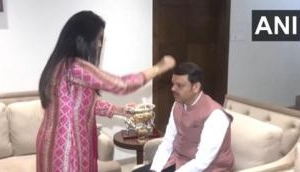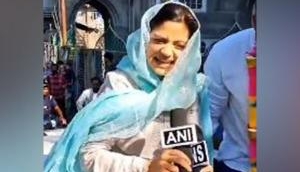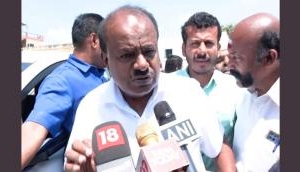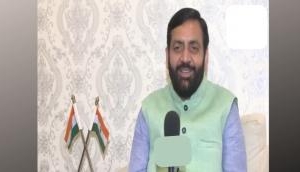Opposition drives home the point: India is not Gujarat, Mr Modi

Leaving aside its political differences, the Opposition has got together on the issue of demonetisation, and is driving home a strong political message for Prime Minister Narendra Modi. The writing on the wall is clear - that for him, Gujarat might have been India in the past, but India is not Gujarat.
This signifies that the manner in which Modi ruled in Gujarat for 13 years is not acceptable to his political opponents in Delhi who, despite being in negligible numbers particularly in the Lok Sabha, have been able to show a mirror to the government on the misery that demonetisation has unleashed on the poor across the country.
It needs to be pointed out that the 'dictatorial' mode, or what has come to be known as Modi's style of functioning, is simply an extension of his style of functioning in Gujarat. His followers or fans, or for that matter, his subordinates, might refer to it as the acclaimed 'Gujarat Model', and Modi is trying to replicate the same at the Central level.
In Gujarat, Modi was constantly under attack by his opponents, political observers and the intelligentsia for his 'non-democratic' way of functioning, which is now at play at the Centre.
"One needs to go back and look at the brazen manner in which Opposition protests were handled in the state Assembly. The Opposition, which was already weak in the state, was not given any importance under Modi's rule. Look at the trend, and you will see how controversial Bills were introduced only on the last or the penultimate day of state Assembly sessions. The moment the Opposition raised a noise, a minister would step in and call for its expulsion, which was duly carried out. After that, it was a field day for the ruling party, and things would move as per its wishes," recalls senior political observer and media professional RK Mishra.
How the Question Hour was destroyed
The most interesting aspect related to the functioning of the government is the manner in which the whole institution of Question Hour was destroyed under Modi's regime. Veteran journalist Rajiv Shah recalls how there was a practice started of sending police personnel to ruling party MLAs and asking them to sign bland question forms after the message had been conveyed to them that questions would be duly filled in on their behalf.
"I managed to get the details from a BJP MLA who had a different opinion on Modi's style of functioning," he says.
This reporter attended several Question Hours in the Gujarat state Assembly that can best be described as a mockery, because with such government 'sponsored' questions, as critics put it, ministers would come out with very long answers that would amount to eulogising the government's achievements.
The worst part was that there would not be more than eight to 10 questions, and the whole purpose of the Question Hour stood defeated.
Another very interesting aspect of the Gujarat Assembly under Modi's rule was that quite often, the questions and their answers were decentralised to the extent that the answers only pointed to hyper-local level issues, and it was very difficult to construct a state-level scenario or projection.
For example, if the question was about farm distress, the question would be microscopic to the extent that information on only a taluka or block or district would come. This could be interpreted conveniently by the government.
Guest appearances in the Assembly
Over his 13-year tenure in Gujarat, Modi was hardly visible in the state Assembly when sessions were on. "He just intervened in discussions rarely during the first two three years of his tenure, and this became a remote possibility after that. He would come for the question hour and leave after that to monitor the proceedings on the television screens in his office. If there were some instructions for the ministers, he would either call for them or send directions across to them," recalls Shah.
In fact, most of the controversial Bills passed by the Gujarat Assembly, were introduced at the fag end of sessions, and passed when the Opposition had either been thrown out or had walked out, not leaving any scope for a long debate.
Some of the controversial Bills passed by the Assembly during Modi's tenure included an anti-religious conversion Bill, the Gujarat Control of Organised Crime Act (GUJCOC), Gujarat Lokayukta Aayog Bill etc. Serious debates on issues like alleged fake encounters, particularly when the present BJP president Amit Shah was the Gujarat home minister, did not take place, and the Opposition stood frustrated.
"Modi's style of functioning means trying to convey that he is above all. He would prefer one-sided communication on any issue through his Mann ki Baat, rather than answer to the Opposition on the floor of the house. Despite having drawn flak on various issues from the courts, he would still try to have his way by various means, like he did on the Gujarat Lokayukta issue, or for that matter, on the shifting of lions from Gir forest in Gujarat to Madhya Pradesh," Mishra recalls.
No delegations, no discontent
This reporter also experienced that during Modi's tenure in Gujarat, the state secretariat hardly saw any visitors in the form of delegations from different parts of the society - be it teachers, employees, health workers etc, which is very common across India.
The reason was simple, Modi was inaccessible, and such groups were told to come through district collectors via the Swagat Portal of the Gujarat government.
When questioned, BJP leaders would reply that there were no groups seen in the secretariat because there was no discontent under Modi's rule.
But things are different at the national level, particularly on the issue of demonetisation. The Opposition, for now, has managed to take up the issue and convey to the government that all is not well with the masses, unlike the government's claims.
It has been able to show a mirror to the government that people have been hit hard, despite surveys to the contrary being projected through some sections of the media.
The Opposition has also sent across the message that for raising the voice of the people, parties often need to cross lines and come out with a united front in the face of the majority that the BJP has, at least in the Lok Sabha.
Edited by Shreyas Sharma
More in Catch
Modi's note ban is a monumental failure: Manmohan Singh
Did you expect India's demonetisation woes to hit BJP at the by-polls? You were wrong!
Demonetisation survey basically asks 'are you with Modi or with black money?'
First published: 24 November 2016, 5:54 IST





![BJP's Kapil Mishra recreates Shankar Mahadevan’s ‘Breathless’ song to highlight Delhi pollution [WATCH] BJP's Kapil Mishra recreates Shankar Mahadevan’s ‘Breathless’ song to highlight Delhi pollution [WATCH]](https://images.catchnews.com/upload/2022/11/03/kapil-mishra_240884_300x172.png)

![Anupam Kher shares pictures of his toned body on 67th birthday [MUST SEE] Anupam Kher shares pictures of his toned body on 67th birthday [MUST SEE]](https://images.catchnews.com/upload/2022/03/07/Anupam_kher_231145_300x172.jpg)






